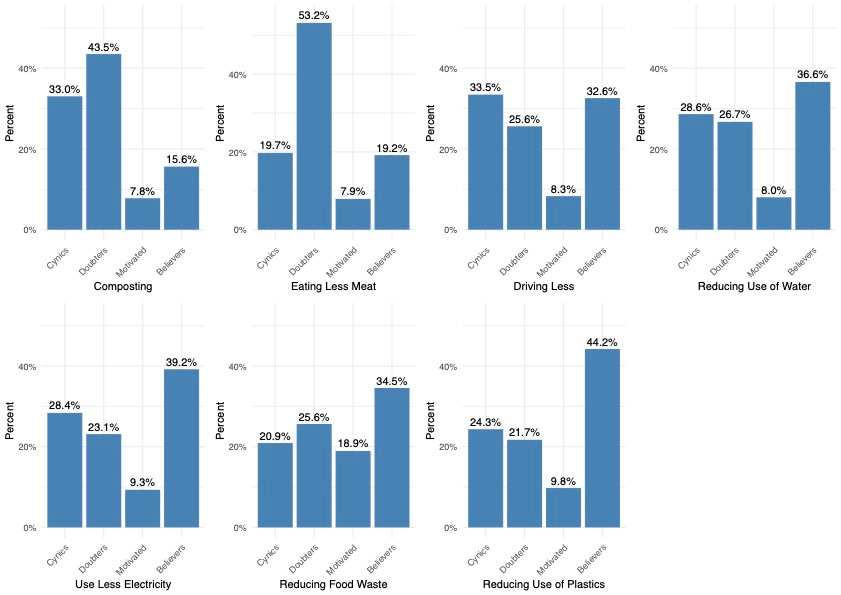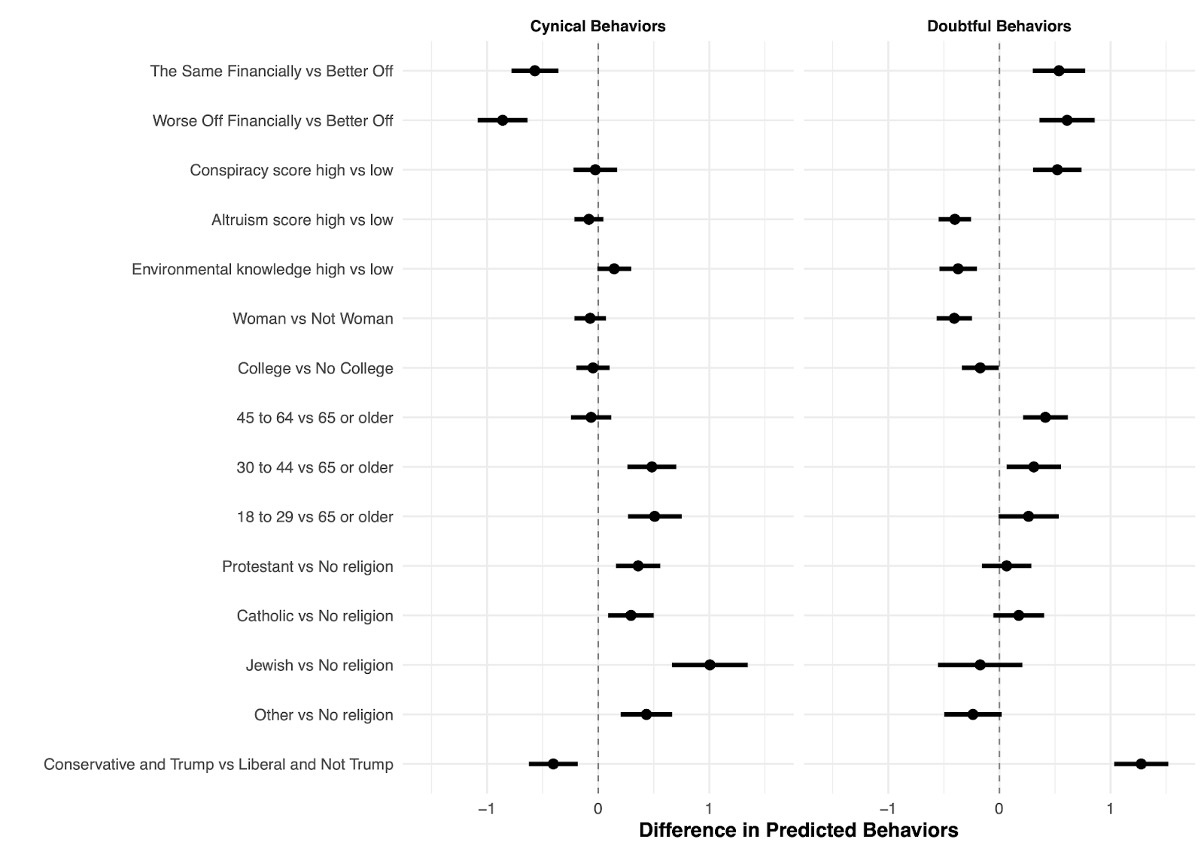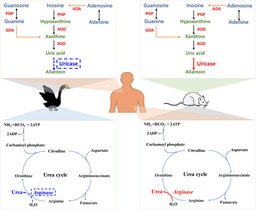Identifying American climate change free riders and motivating sustainable behavior
Published in Earth & Environment and Statistics

Why we did this
Mobilizing people for shared goals in sustainability and climate mitigation is hard. It is essential to understand what drives individual motivation for a sustainable lifestyle change and what we can do to influence it in an effective way.
In this paper, we identified and analyzed the individual characteristics associated with skepticism or inaction toward sustainable behaviors. Identifying individuals who ‘free ride’ and benefit from the public good without engaging in sustainability can help us better form behavioral change strategies.
What we did
We surveyed 2096 American voters to seek answers to the above questions. We based our survey questions on the well-known theory of collective action by American economist and political scientist Mancur Olson. This theory, outlined in his 1965 book "The Logic of Collective Action," argues that cooperation among individuals is crucial for collective action to occur. Olson pointed out the existence of 'free riders,' individuals who enjoy the benefits of public goods without actively participating in sustainability efforts. In our study, we define a public good as a clean environment, encompassing elements like air quality and biodiversity.
We identify two key groups of free-riders: cynics and doubters. Cynics are those who understand that human actions contribute to climate change and recognize the importance of changing behaviors but do not actively engage in sustainability practices. Doubters are those who neither recognize the importance of these actions nor engage in them.
In this paper, we focused on seven sustainable behaviors: reducing electricity use, minimizing meat consumption, driving less, using fewer plastics, reducing food waste, reducing water consumption, and composting practices. These specific behaviors were chosen because they were featured in earlier surveys about American views on climate change and sustainability conducted by the Pew Research Center in 2019. We then asked respondents how much of a difference they think adopting these seven sustainable practices in daily life has on environmental protection.
Next, based on these two sets of questions we classified respondents according to their involvement in these activities and whether they believe it makes or doesn’t make a big difference to engage in them; see Table 1.
| I do it | I don’t do it | |
|
Big difference |
Believers |
Cynics |
|
Slight difference |
Believers |
Cynics |
|
Very small difference |
Motivated |
Doubters |
|
No difference |
Motivated |
Doubters |
|
Not sure |
Motivated |
Doubters |
We then decided to focus on the two groups of free riders, cynics and doubters, and we sought to explore what can motivate them. We analyzed the two groups separately and explored what factors predicted engaging in cynical and doubtful behaviors. Cynical behaviors refer to actions that respondents do not take but believe would positively impact the environment if they did. For example, if a respondent does not reduce electricity usage but believes that reducing electricity usage would make a difference for the environment, this non-action is classified as a cynical behavior for that individual. Doubtful behaviors are actions that respondents neither undertake nor believe would make a significant environmental difference.
For our empirical analysis, we used statistical modeling techniques like ordinary least squares (OLS) regression and multinomial logit regression to test the relationship between various socio-demographic variables and engagement in either cynical or doubtful behaviors. OLS usually offers high interpretability of the relationship between the variables, and therefore we reported its results.
What we found
Our survey results show that doubters are a majority when it comes to eating less meat and composting. However, when we look at cynics and doubters together, these two groups constitute a majority on all 7 sustainability behaviors except for two (i.e., reducing food waste and reducing the use of single-use plastics); see Fig 1.

Our regression analysis results show that people who are less well-off financially, who believe in conspiracy theories more, who are less altruistic, who have lower knowledge about environmental issues, who identify as males, who did not go to college, who are relatively younger, and who voted for Trump and identify as more conservative engage in more doubtful behaviors, meaning that they are less likely to engage in sustainable behaviors and less likely to believe these behaviors make a difference.
Our regression analysis results show that people who are less well-off financially, who believe in conspiracy theories more, who are less altruistic, who have lower knowledge about environmental issues, who identify as males, who did not go to college, who are relatively younger, and who voted for Trump and identify as more conservative engage in more doubtful behaviors, meaning that they are less likely to engage in sustainable behaviors and less likely to believe these behaviors make a difference.
Contrary to what we predicted, they are not more likely to be religious and they are more likely to be younger than older. The political variables produce the strongest association by far: being conservative and voting for Trump is associated with 1.5 more doubtful behaviors relative to someone who’s liberal and did not vote for Trump. In other words, this means that those who are conservative and those voting for Trump are those who are engaging in fewer sustainable behaviors and who do not believe they make a difference.
Cynics appear overall to be slightly different on most characteristics. People who are more well-off financially, who have higher environmental knowledge, who are younger, who are religious, and who are more liberal and did not vote for Trump are more likely to engage in more cynical behaviors, meaning they are less likely to engage in sustainability behaviors, while believing these behaviors would make a difference, see Fig 2.

Why it matters
Climate change mitigation requires collective efforts across individual, local, national, and global levels. Central to this endeavor are individual behavioral changes, which demand significant lifestyle adjustments. This paper studies the factors that predict engagement in sustainable behaviors among American voters, focusing on two distinct subgroups of free-riders: cynics and doubters. We uncovered valuable insights into their motivations and socio-demographic characteristics.
Understanding free-riding behavior is important as it can help policymakers, decision-makers, and environmental activists design collective action strategies that can persuade deeper change.
Cover image by Pawel Czerwinski under the Unsplash License CC BY 4.0.
Follow the Topic
-
Scientific Reports

An open access journal publishing original research from across all areas of the natural sciences, psychology, medicine and engineering.
Related Collections
With Collections, you can get published faster and increase your visibility.
Reproductive Health
Publishing Model: Hybrid
Deadline: Mar 30, 2026
Women’s Health
Publishing Model: Open Access
Deadline: Feb 28, 2026





Please sign in or register for FREE
If you are a registered user on Research Communities by Springer Nature, please sign in